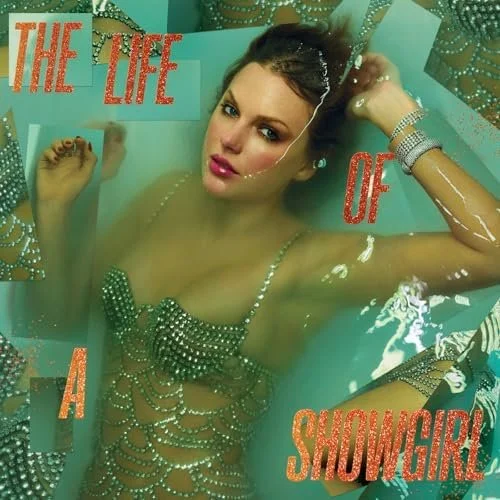Written by Grace Chandler
As a long-time Swiftie, I found “The Life of a Showgirl” weak at best, and problematic at worst.
Also as a long-time Swiftie, I expect the record will grow on me: I’ve never not liked a Taylor Swift album immediately before, but even just hearing the songs on social media has me warming up to them. Regardless, I think it’s perfectly okay to criticize the record for what I view as the major issues.
Easily, the songwriting was the weakest of any of her eleven other albums. It was overly simple yet not endearing at best, and AI-like at worst. That’s not to say there aren’t good lines, but it doesn’t feel up to par with the skills Swift has demonstrated in the past. Some may say she doesn’t owe us anything lyrically, and she’s free to make the music she wants to - and while that’s not untrue, she has shown us that she’s capable of writing happy songs with good lyrics. There’s no reason she shouldn’t be able to do it again.
There are two problems I found with the actual content of the album. The first is “Actually Romantic” as a response (and diss track) to “Sympathy is a Knife” by Charli XCX.
“I mind my business, God’s my witness that I don’t provoke it,” sings Swift on the aforementioned track. If this was true, this song wouldn’t exist.
Simply put, “Sympathy is a Knife” is not a diss track. It is a song about XCX’s own insecurities, and how she admires Swift so much that she feels she could never measure up to her. It is beautifully written and heavily vulnerable. For Swift to respond with a line like “when the coke’s got you brave” is incredibly irresponsible. It shows a lack of media literacy, not to mention a lack of compassion for an experience that many girls can relate to. Especially coming after more than a decade of dozens of high-profile friendships with other talented female artists, “Actually Romantic” is a disappointing response to a song that wasn’t an attack in the first place.
Now, regarding the second issue, I want to preface that I’m not assuming intentionality in anything I’m about to say. I just think it’s a point that needs to be made.
“The Fate of Ophelia,” the lead single from “The Life of a Showgirl,” is a gross mischaracterization of the titular character. Ophelia’s tragedy isn’t just her death, it’s her life and lack of autonomy, as well. The latter idea has certainly been seen in previous works by Swift, however, for Swift to use this song to imply that she was “saved” by her partner Travis Kelce from a tragic fate is overtly un-feminist. It asserts outdated narratives that a woman can only be made whole by a man, and only adds to the idea that she only writes songs about her love interests.
In addition, “Wi$h Li$t,” though seemingly innocuous, supports this claim. There’s nothing wrong with desiring to settle down and start a family, however, we have to realize that this idea is being perpetuated by Swift: a peak example of feminism.
Though ideologically the two women are very different, this context is not unlike the one of Erika Kirk. Kirk recently claimed at her husband Charlie Kirk’s funeral that “[a woman’s] heart has to be fully with the home.” Kirk has earned multiple degrees, worked multiple careers, and now serves as the CEO of a multimillion dollar group whose primary concern is politics. Similarly, Swift found fame as a musician at a young age, has reached achievements no other musician has, and has recently become a billionaire. None of the success either woman has had would be possible without feminism.
Again, there’s nothing wrong with wanting to settle down and start a family - in fact, it’s another opportunity that feminism allows. To pair the idea with the “male savior” narrative, however, and add in the context of Swift’s wealth and success, it seems distasteful.
I would say “The Life of a Showgirl” was a recession indicator, however, a recession indicator usually involves good pop music. “The Life of a Showgirl” is actually an indicator of the conservative space that we’re currently in. Swift sacrifices the success of the “Eras Tour” and her career thus far to make a “tradwife” pop album that’s wholly not impressive in comparison to the rest of her discography.
Once again, I expect the album will grow on me somewhat. It’s fully okay to disagree with the thoughts I shared, but I thought it valuable to call into question the claims Swift makes through her music.
-
Add a short summary or a list of helpful resources here.
